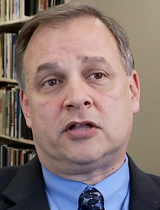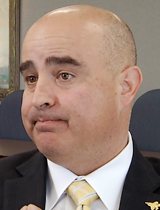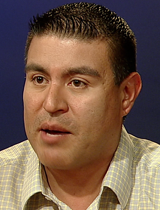Road maintenance will be top priority for the Arizona Department of Transportation in the next five years, while expansion of highways will be reduced, says the agency's director.
 John Halikowski, director, ADOT.
John Halikowski, director, ADOT."Seventy-six percent of our program, roughly, used to be an expansion of the system," Director John Halikowski said in an Arizona Week interview for Friday's broadcast. "Now we're seeing about that same percentage going into maintenance in order to preserve the investment we have on the ground."
Halikowski said what his department calls the "dramatic shift" in priorities comes because dedicated funding for roads and highways is declining.
A proposed update of the state's five-year transportation plan outlines the shift and attributes it to an expected need to cut $350 million from the budget by 2017. That is because fuel-efficient vehicles and inflation have eroded the proceeds from the state's primary transportation funding source, the gasoline tax.
 Todd Sanders, president and CEO, Greater Phoenix Chamber of Commerce.
Todd Sanders, president and CEO, Greater Phoenix Chamber of Commerce.The tax has remained at 18 cents a gallon for 20 years, and in that time inflation has eroded it to the equivalent of 8 cents, said Todd Sanders, president and CEO of the Greater Phoenix Chamber of Commerce.
Sanders, also in an Arizona Week interview, said that has led his organization to focus on making certain that dedicated transportation money goes where it is supposed to.
"The biggest focus for us in the past few years has been how do we protect those dollars, that are essentially transportation dollars, from going somewhere else to fill a different hole," Sanders said.
In the last 12 years, faced with significant budget deficits, the Legislature has moved $1.6 billion out of the dedicated transportation pot, called the Highway User Revenue Fund, into the budget of the Department of Public Safety, said Ramon A. Gaanderse, executive director of the Tucson Utility Contractors Association.
Gaanderse said that has left many of his organization's members, most of which do road construction and maintenance work, struggling to find skilled workers because they move to other states where jobs are more plentiful. He estimated that some Arizona contractors have lost half their skilled workers and very few, if any, have added workers.
Halikowski said the reductions could have an impact on the state's economy, and that should call for an overhaul of the funding system.
 Ramon A. Gaanderse, executive director, Tucson Utility Contractors Association.
Ramon A. Gaanderse, executive director, Tucson Utility Contractors Association.
"The state's really at a pivotal point when we look into the future in Arizona's place in trade and the economy and the fact that people want to have jobs and a good economy," Halikowski said. "The transportation system is really central to having that."
Sanders agreed: "To have an effective transportation system to get people into the door, not only as a workforce, but as a customer, is really important to the business community."
State legislators have discussed new funding sources but are loath to talk about them in terms of tax increases. Sen. Steve Pierce, R-Prescott, vice chair of the Senate Transportation Committee, said public-private road-building partnerships and tolls on new roads could be among the solutions.
No significant legislation to change funding formulas for transportation is under consideration in the current session, said Rep. Victoria Steele, D-Tucson, a member of the House Transportation Committee.
"And that's a shame," Steele said. "I think we need to address that. We need to be moving on that. At this point, we are going to have to do something very different than what we've got right now."
The Department of Transportation is taking public comments until May 17 on its proposed five-year plan. To submit comments, email fiveyearprogram@azdot.gov. Public hearings will be conducted April 12 in Tucson and May 10 in Flagstaff to allow for additional community input.
The State Transportation Board is expected to adopt the five-year program at its June 14 meeting in Pinetop-Lakeside, the state agency's website says.

By submitting your comments, you hereby give AZPM the right to post your comments and potentially use them in any other form of media operated by this institution.